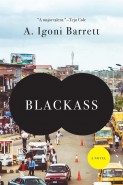
Book Review: Blackass by A. Igoni Barrett
 Blackass
Blackass
A Novel by A. Igoni Barrett
Graywolf Press, 2016
ISBN-13: 978-1555977337
$16.00; 272 pp.
Reviewed by Pedro Ponce
Comparisons between Blackass, A. Igoni Barrett’s first novel, and Franz Kafka’s The Metamorphosis will be inevitable. Barrett himself welcomes the connection with an opening epigraph from Gregor Samsa, the Kafka protagonist who finds himself transformed overnight from harried traveling salesman to grotesque insect. But while abrupt, unexplained transformations drive both narratives, they differ provocatively, not just in terms of time and place, but also in how each represents the experience of radically shifting identities. There is never really a question of Gregor returning to the human race; his family sequesters him in his room while they struggle unsuccessfully to resume a pretense of the life disrupted by Gregor’s metamorphosis. Meanwhile, Furo Wariboko, Barrett’s protagonist, must arguably come to terms with a more challenging transformation, retaining the humanity he has taken for granted after he finds himself trapped in a new human body.
As in Gregor’s case, Furo’s transformation is ill-timed. The morning of a long-sought job interview, the unemployed black Nigerian wakes up to discover, “the pink life lines in his palms, the shellfish-coloured cuticles, the network of blue veins that ran from knuckle to wrist, more veins than he had ever noticed before. His hands were not black but white…same as his legs, his belly, all of him.” Having turned “white, full oyibo, no doubt about it,” Furo manages to evade his family’s notice and make it to his appointment, only to face the skepticism of Obata from Human Resources, who refuses to believe a white man can have a Nigerian CV. “As Obata spoke, Furo began to see that he had no past as he was and no future as he had been. His folder of documents now felt useful only as fuel for Obata’s anger. He had no hope of getting this job, any job at all, not as long as his own credentials proved him a liar.” But after an interview with Arinze, Obata’s superior, who determines that “we need a man like you on the team,” Furo leaves the office with a better job, as marketing executive for Haba! Nigeria Ltd, a seller of business books.
Furo’s fortunes continue their ambivalent progress as he tries to shed all connections to his old life. He attracts the attentions of Syreeta, an on-again, off-again girlfriend whom Furo never entirely trusts: “He understood what she wanted […] The white man’s money, that’s what.” Later, he is granted access to a major client who mistakes Arinze for Furo’s assistant. In writing at once cutting and nuanced, Barrett exposes the fickleness with which difference is perceived and valued, as well as the possibilities implied in Furo’s blurring of identities.
In a metafictional turn, Furo meets Igoni, a fictionalized version of the author, at a shopping mall. Igoni becomes interested in Furo not only as a writer but as a fellow misfit between identities. As parallels between their stories emerge, Barrett infuses the novel’s narrative structure itself with a suggestive fluidity. Muses the fictionalized author, “Long before Furo’s story became my own, I was already trying to say what I see now, that we are all constructed narratives.”
We have at least another century left in the Age of Kafka, but Barrett suggests that, perhaps, we’ve finally made it to a post-Samsa world.
Pedro Ponce is the author of Dreamland, a novel forthcoming from Satellite Press.

Leave a Reply